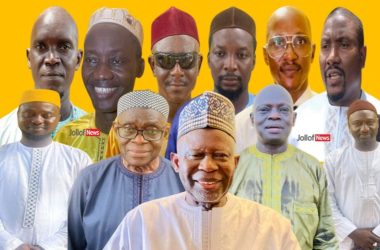
(JollofNews)- Religion has been a powerful political force employed by Second Republic to assert control over Gambians and influence their way of thinking.
In this respect, religion has been employed as Trojan horse in which the government strengthens its grip on power with total disregard of Gambians’ constitutional right. The use of Islamic rhetoric and declaration of the country as an Islamic State constituted an assumed strategic move by Jammeh’s government to widen its support at domestic and international level.
The Islamic hardliner rhetoric were designed to sway the Muslim population at home than the Christians given the electoral advantage in doing so as 90% of Gambians are Muslim. The manipulative strategy seemed to have influenced misguided individuals to acquire a sense of belonging and believing together. They behaved collectively in furtherance of common purpose to protect shared religious values. Whether this move served the Second Republic well is yet to be documented.
However, there can be no doubt the strategy seems to have persuaded some Muslims that the government would consciously favour Muslim’s values over other religious values. In effect, Islam became ‘the preferred state religion’ even though the Gambia is a secular state pursuant to its constitution.
The government’s strategy was not only deployed to achieve legitimacy, but also an attempt to revive the Gambia’s impoverished economy by wooing donors from the Arab world. In many respect, this strategy was a recipe for disaster for a start as it failed into part before leaving the doors of State House. It did not have necessary meat to yield any laudable outcomes. The Gulf States were unwilling to be associate themselves with any narrative that has a hint of Islamic Radicalism given its connection with ‘war on terror’. It is also the case that these states operate in existing global system which is governed by the West on western ideals. It is self-evident that the government did not reason well to adopt progressive and inclusive foreign policy.
A well-considered international relations’ strategy seems essential for a sovereign state to advance the interest of its people. Surely, that cannot be achieved by ranting religious intolerances and hatred towards the most vulnerable people in our society.
Although Islam is a noble religion that promotes equality of all human beings, it has been reconstructed by the some western states as illiberal and fundamentalist. Obviously, some European states are intolerable of the public and collective exercise of Islam because of its perceived connection with Islamic terrorism. For instance, the legal restriction on the display of veil in public and criminalisation of irrational Islamic radicalism are all in part effort to contain pernicious fundamentalism. I submit the government should have adopted sound international relations and foreign policy that espouses religious tolerance without compromising the Gambians’ values.
After all, the Gambia is a secular state built on religious freedom and tolerance. While I accept the point that a mere declaration of Gambia as an Islamic State could not have deconstructed the secular society that is already anchored, it is strategically unwise to make a symbolic declaration that resulted in further isolation of the Gambia from its main European donors. It was naïve to think the Chinese would have perfectly replaced western donors in terms of investment. Although the Chinese have made massive investments in some African countries particularly for raw materials, many critics see them as ruthless competitors whose only focus is to create a monopoly at the expense of local businesses.
Furthermore, the government’s position on the Taiwan question served as an impediment to form a meaningful relationship with China. Therefore, logic dictates unless government changes its position, a viable Gambia-Chinese relationship was a wishful thinking.
Rightly so, viable international relations with other states will naturally vary according to the weight of vested interests at stake. This is in line with realist paradigm of international relations in which states act rationally to tightly pursue their national interests.
The government’s strategy was full on appetite to create new friends, but thin on reasoning. Socrates (a Greek philosopher) once said reasoning has the ability to educate appetite and spirit to prevent ill-considered behaviours. That may be detrimental to self-interest. It follows that reasoning is a common endowment of mankind that allow us to reasonable steps to advance human development. In my view, the government’s international relations strategy lacked prudent reasoning to advance Gambians’ interests.
It is a given fact that the government’s strategy was more effective at home than abroad. In order to attain a status of a creditable religious leader, the former President used to wear a distinct white robe. He deliberately deployed rhetoric such as ‘the wish of Almighty’ and ‘God fearing people’ in order to make his messages resonant with the Muslim community.
Indeed, such rhetoric was deployed when he lost the election, in which he demanded for fresh election be conducted by a ‘God fearing Electoral Commission’. What seems unclear is whether religious leaders fell for his tricks or they feared of being subjected to government’s brutalisation. Indisputably, they failed to question the authenticity of neither his rhetoric nor his image. Governance was marred by cash give away events that are designed to capture the support of religious leaders.
The public display of cash bundles and the Holy Quran undoubtedly effective rituals seemed to have distracted religious leaders’ attention from grasping the reality at hands while being indoctrinated. It follows that the efficacy of ritual depends on the participants not grasping what is actually happing. From one perspective, the ritual practice of cash distribution did not only bolster government support, but also casts the morality of the participants.
Religious leaders were little uncritical of the government’s illegal acts. It may be well argued that their silence was due to fear of reprisal rather than cash indoctrination. Whatever the reasons were, there was an absent of divine and moral guidance from religious leaders. Consequently, the government was left to its own device to cultivate terror and fear in Gambians against all secular and democratic principles.
The notion that Leaders are selected by a divine God/Allah, not by the will of ordinary people may be religiously acceptable, but irreconcilable with logic and democracy as citizens freely exercise their sovereign right at the ballot box to choose political leaders. The Legitimacy of any government can on only depend on the informed consent of the people.
The governed have the right to determine the way in which a government operates to protect their interests. While religion plays an important role in our society, it is necessary to limit its role in politics to maintain its moral standing. In my opinion religious leaders run the risk of being immersed in corruption and immorality that comes with civil power if they interfere in state politics. That explains why it is imperative to separate religion from the state in order to maintain religiosity of religious leaders.
The cardinal principle of secularism encompasses state neutrality, religious liberty, religious equality. Although secularism preserves the fundamental freedoms of all citizens, it also gives exclusive power to the state. As a result religion became ineffectual to influence public policy.
However, Jammeh’s government was more forceful in deploying religion as a disguised coercive power to influence Gambians’ minds. It articulates a notion that we must be ‘God fearing’ by slavishly accepting government’s policies without subjecting them to succinct scrutiny. It is unislamic to oppose leaders because their’ actions are ordained by Allah. Such inductive messages have allowed the government to violate citizens’ rights without a shred of condemnation from leaders. The uncomfortable truth is that religious leaders, senior civil servants and parliamentarians were all complicit in government’s wrong doing given their decided silence. Lesson must be learnt!!
The government has used all ingredients of coercive power to forceful win the hearts and minds by invoking Islam rhetoric. However, the way in which it conducted international relations in pretence of religious righteousness represented its muddled thinking to generate international support.
I do hope a sense of sobriety will prevail over fear. We must continue to work and enlighten our people for a New and Prosperous Gambia that is able to play a more meaningful role in the global village – that we will be seen to promote the values of democracy and the rights of all religious groups. Religion must continue to play an active role in fulfilling the spiritual needs of those who care to partake in its teachings beliefs. The essences of religion are ethics, morality and good behaviour. In my view, these fundamental norms are likely to be comprised, when we consciously participate in grandiose cash give away events designed to influence public opinion for political ends. Undoubtedly, forging any meaningful international relations require progressive strategy which is imbued with inclusivity. Political discourses must be free from blatant expression of Islamic radicalism.
As an optimist, I firmly believe that the ‘Great December Reawakening’ (GDR) will continue to infuse the spirit of unity among Gambians!!
Forward with The Gambia. God bless you all.





With 95.% of the population we still can’t call our country as islamic republic just because we can’t face the west let’s be honest, Our politicians are cowards in defending us as Muslims, the Gambia is and has been an Islamic republic for the nature but we do not have the courage to call nustro pais as a country muslim to content to US / USA, but Allah is watching us it’s a shame,, Mr Trump hate Islam so we have to make him happy
In fact one way forward would be to guarantee, or at least normalise (the president’s appointed to parliament is normally from members of …..) the practice of appointing minority opinion to parliament , for example – without any need to call it proportional representation or anything like that – should in my opinion help send a message of a deliberate attempt on the side of the government to seek an implement greater diversity of views on particular topics. The benefits are that such a move should go a long way in assuring members of minority groups, including religious minorities, disabled, or otherwise afflicted members of the community, that, their, sometimes uncomfortable, concerns will be heard and addressed.
Moreover such a policy is transferable include reserving seats, or normalising the practice of minority groups’ presence on appointments on boards commissions, tink-tanks, security forums, and other influencing bodies: eg trade unions. Again the benefits are self evident, since it can be expected that by adopting a deliberate policy of seeking and addressing the diversity of community views in its decision making, government credibility and support for its policies is increased, feelings of alienation reduced, and feelings of social inclusion and cohesiveness are increased.
Further, and hopefully, with each member of the community irrespective of religion, other affiliation, afflictions, should also experience a greater sense of ownership of their respective destiny with the community. That can only accelerate national economic development, adherence to rule of law, security, and competitive and innovative behaviour. For example, Groundnut exports PRE-THE SECOND republic, averaged 230, 000 tonnes per year, but under the Second Republic had fallen to a miserable 25,ooo tones, or to less than a third of its FIRST REPUBLIC days! The question naturally, is why? And part of the answer must have something to do with a feeling of alienation, exclusion, and general loss of control over one’s own affairs, and being constantly hounded and dictated to about what one can, and cannot do, where one can and could not sell ones produce, who had access to, and who was excluded from access to such inputs as fertilizer, and mirco-finance, to whom one could, and could not sell one’s harvests.